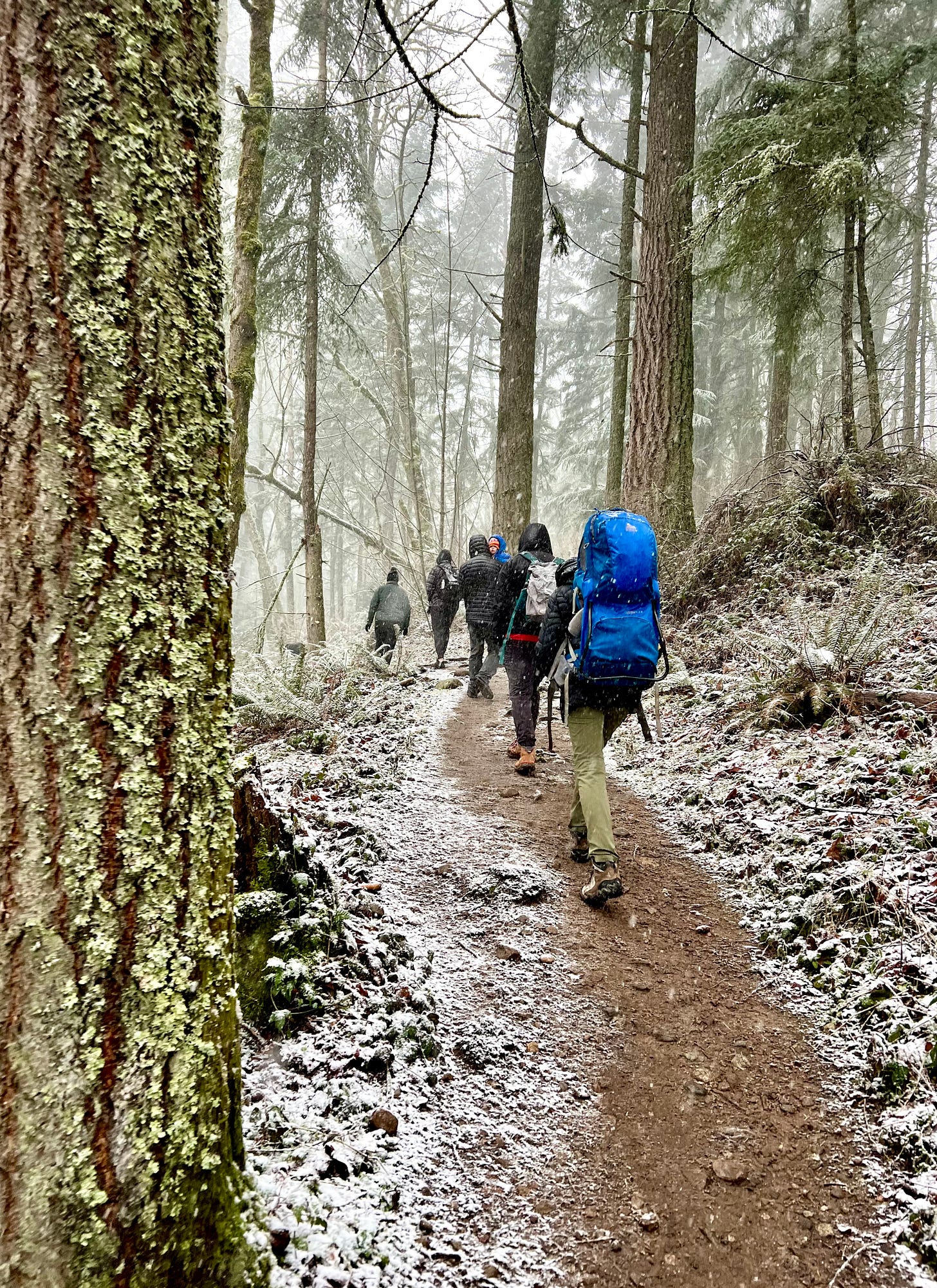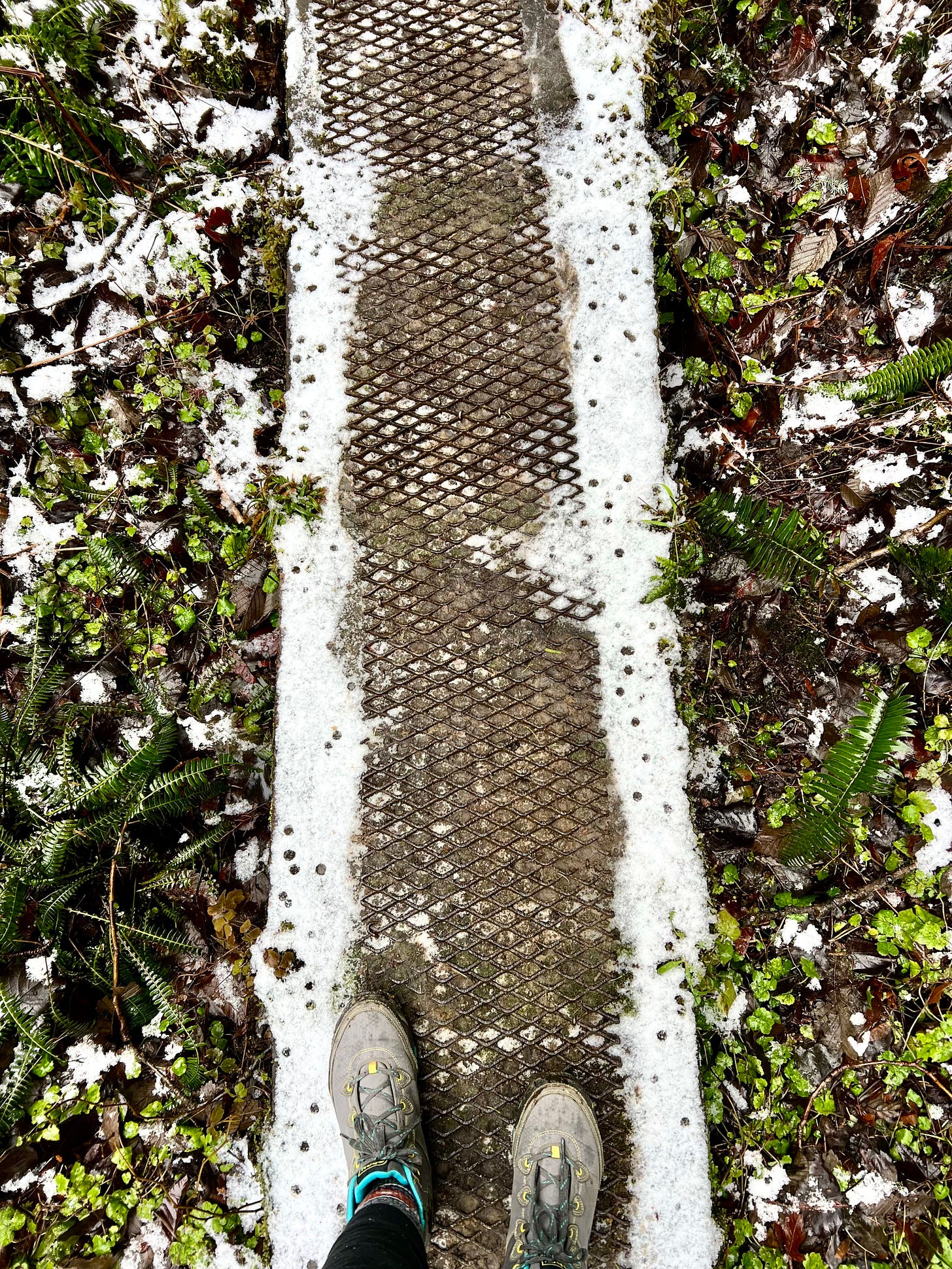In early February, we took a trip to Seattle to be reunited with longtime friends. We ate good food and chased toddlers around and hiked in mossy forests and recreated a photo from nine years ago. Back home, we had more extreme cold, complete with punishing windchills. And then, finally, there were warm days. I felt like a different person with newfound energy, a desire to take the dog on walks, and an inclination to ignore everything else and be outside for as long as possible.
For this month’s practice, I’m sharing four things I noticed and three things I named. I hope these words will give you just a little more language to name what’s often hidden, but deeply true, in your own life.
Four Things I Noticed
I’m trying to pay attention to the world around me and to the details of my days. Sometimes these observations may lead to bigger realizations, but other times, the act of noticing is enough. Here are four things I noticed in February:
The dancing patterns of early spring sunlight on the wall, the couch, and the floor of the coffee shop.
How refreshing it is to sit near the windows and feel the sun’s warmth on my face.
The pup’s nose poking up over a pillow, the cutest view from my desk.
Giant, soft snowflakes falling on a lush forest in Seattle. The contrast of white against green was mesmerizing, so very different from snow on bare branches in the Midwest.
Three Things I Named
I have a loud internal life, and naming what’s going on on the inside helps to quiet things down. When we can put thoughts and emotions into words, fear begins to lose its power, next steps come into focus, and we realize we’re not actually alone. Here are three things I named last month:
1. There’s something sacred about friends who have walked with you through many seasons.
You know each other’s stories and scars. You share burdens and joys and cheer each other on, understanding the hurdles like few others can. Their people become yours too and life is richer for it. Friendships that grow with us over time are worth the investment—always.
2. It can be helpful to give my mind some space.
When I get time alone, I tend to think I should use it to dive deep into processing something or be intentional about brainstorming my next steps in any given situation. But I’ve been reminded recently how refreshing, and necessary, it is to give my mind room to wander, free of an agenda or an inexplicable need to be “productive.”1
On a slow Saturday afternoon last month, I spent some time alternating between journaling and staring out the open window, letting my mind go where it needed to as I enjoyed the cool breeze. I returned to the page occasionally, but I didn’t rush it. I didn’t try to force any revelations. Other times, I’ve created some mental space by driving in silence or listening to music instead of a podcast or an audiobook.
Our brains are incredible in the myriad of ways they’re constantly analyzing input and making connections and storing memories. Sometimes the most helpful thing is to trust my mind knows what it needs and allow it to flit about, landing here and there momentarily before taking flight again.
3. I want to shift the way I view change.
In many ways I long for change, but I fear it too. I’m always afraid of the things I’ll lose and rarely imagine the things I could gain. The things I’ll lose tend to be tangible; I know what they are because I’ve had them. While the things I might gain are intangible. They’re could bes, hopefullys, maybes. They’re shifty and translucent and harder to grasp.
When something changes, I instinctively look back with a hint of regret. Did I realize what I had? Did I truly take advantage of it? Should I have done things differently? That kind of reflection can be helpful, but being hard on ourselves doesn’t get us very far. We do the best we can with each decision as it comes, even if we would do things differently in hindsight.
There are things to reflect on and things to grieve in any change, but I want to make room for more possibilities too, to see the ways in which I might expand, even as I miss what once was.
Questions for Your Practice
What could it look like to give your brain some space right now? Do you need to turn off the input and let your mind wander? Do you need focused silence? Do you need a lighthearted distraction?
Do you tend to view change as positive, negative, neutral, or some mixture? Why is that your default?
Think about a recent change in your life. What are you grieving? What are the possible gifts here? In what ways might you expand or grow through this experience?
Words That Resonated
In an effort to give us more language for our lives, here are two quotes that stuck with me last month:
“When the world is struggling or when we are exhausted, we are invited to the holy conversation of noticing. Noticing the sanctuary of spruces still available to us, noticing the stars, noticing our children, noticing the night. We live into the night until it becomes a friend.” —Sarah Bessey, Field Notes for the Wilderness
“I cannot sit idly by in Atlanta and not be concerned about what happens in Birmingham. Injustice anywhere is a threat to justice everywhere. We are caught in an inescapable network of mutuality, tied in a single garment of destiny. Whatever affects one directly, affects all indirectly.” —Martin Luther King, Jr., Why We Can’t Wait
Thanks for being here. With you as we wrestle with the losses and the gifts that change can bring.
Bookshop.org links are affiliate links, so I’ll receive a small commission if you make a purchase.
One note here: If you’re in a difficult season, letting your mind wander might be the opposite of what you need. Maybe your work right now is to reign in your thoughts instead of letting your mind drift to the darkest corners. If this is where you find yourself, I’m so sorry. Please know you’re not alone. Maybe the brain-break you need is a funny show or a favorite movie or a conversation with a safe friend. Go gently here. You’re doing brave, hard work.










